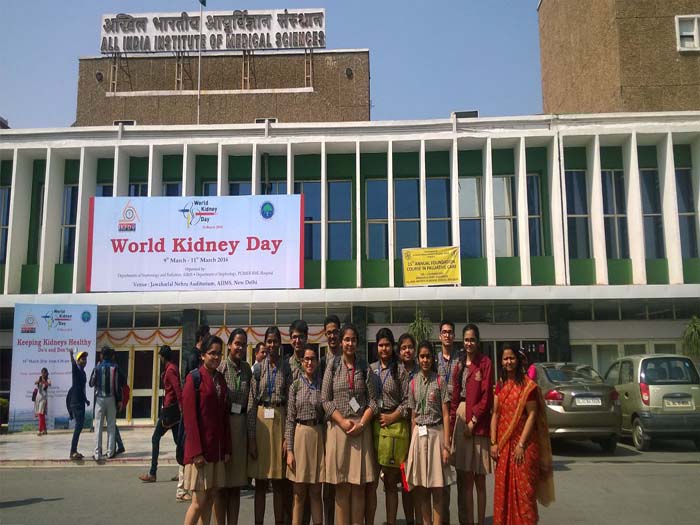Biology students visit AIIMS on World Kidney Day
On the morning of 10th March 2016, the Biology students of class 12, accompanied by their teacher, Ms. Purvi Mehta, attended an awareness programme on the occasion of World Kidney Day at the All Indian Institute of Medical Sciences. The event was organised by the Departments of Nephrology and Pediatrics, at AIIMS and the Department of Nephrology, PGIMER-RML Hospital.
The day started with a lecture by Dr. Navinath who spoke on Kidney Health and Disease. He gave insights into the various kidney- related diseases and suggested ways of keeping the kidneys healthy. According to him, some of the common infections one encounters with this body organ are cystitis (infection of the urinary bladder) and pyronephritis (infection of the kidney itself). Renal stones, he explained is the most painful of these and results in obstruction to the flow of urine in the urinary tract.
[gallery link="file"]
We were familiarised with diseases like CKD (Chronic Kidney Disease) and Acute Kidney Injury in which symptoms such as vomiting, nausea, diarrhoea, weakness etc. persist for days and even months. He concluded his talk by listing the precautions one can take to avoid these diseases. These chiefly include following a healthy diet, exercising regularly, reducing salt intake to a minimal level, besides drinking lots of fluids.
The next speaker was Dr. Aditi Sinha, whose area of expertise is kidney diseases in children. She described some of the causes and ill-effects of kidney diseases associated with children, the most prevalent among them being Congenital Anomalies of the Kidneys and Urinary Tract abbreviated as CAKUT. The prevalence of this disease among children is 15-24.7 per million! The symptoms include morbidity, hypertension, headache, convulsions and red urine etc. The disease can only be diagnosed with a kidney Biopsy, she said. She also told us about Acute Kidney Injury which can occur in children due to a poor blood supply to the kidneys. According to her, many children do not survive this ailment.
Dr. Arun Kumar spoke on the topic Diet in Kidney Disease. He began by carefully uttering the word, Ahamannam'. This means We are what we eat, he explained. We could easily grasp the critical link between good health and balanced food habits, as he proceeded. He said that a patient-specific renal diet mostly constituted of proteins, salts, phosphorus, potassium and fluids. Egg white is also an essential food supplement for a renal patient. He concluded by saying that a healthy diet is very essential to lead the patient to an early recovery.
After the various talks, we walked to the exhibition, area which had displays of the various kidney diseases and tips on how to keep healthy.
In a nutshell, the session provided good learning experience and we realised that awareness is the key to managing kidney disease. Sensitising the population and spreading the message about how to maintain good kidney health is the need of the hour, as it were, as most people are quite ignorant these diseases.
Karan Bansal, Yashmayi Bhoi, class 12A.













